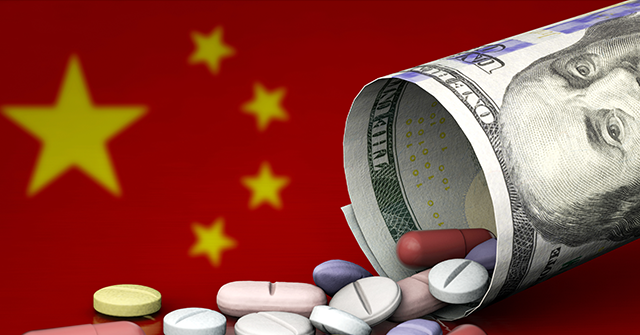
⭐️⭐️⭐️⭐️⭐️
America’s dependence on foreign drug ingredients is a national security and safety issue that is hiding in plain sight.
For years, Washington outsourced the very building blocks of our medicines to cut-rate producers abroad, especially in China. That was a bargain with fine print: quality we can’t verify, leverage we don’t control, and risks that land directly in American veins. The Trump administration was right to call this out and push for a tougher line on Chinese Communist Party (CPP) leadership and strategic decoupling.
Now we need to finish the job by rebuilding U.S. manufacturing and shutting the loopholes that let unsafe products slip through.
Popular and common weight-loss drugs are a prime example. They show both the promise and peril. But the weight-loss boom has opened a back door, and Beijing has walked straight through it. While patients line up for brand-name shots, a shadow supply chain sprang up: copycats of drugs built on Chinese precursors that should never have cleared our ports. That isn’t “access.” It’s an under-the-radar patient pipeline that gambles with American health and our national security.
Here’s the reality: Between September 2023 and January 2025, U.S. data shows over 230 shipments of ingredients coming from foreign manufacturers that hadn’t even registered with the U.S. Food and Drug Administration (FDA). Of those, 30 percent originated from China or Hong Kong and 81 percent of shipments still slipped through.
Unfortunately, these shipments weren’t due to a temporary “shortage” fix. The FDA removed one of the precursor chemicals from its shortage list in February 2025, yet the gray market kept humming because profits are easy, scrutiny is light, and China is happy to sell us what it won’t trust at home. As demand exploded, new suppliers—mostly in China—proliferated with no inspection history and no external quality benchmark. That’s a gift to corner-cutters and counterfeiters. The harm isn’t hypothetical—counterfeit Ozempic has already surfaced in U.S. distribution, triggering seizures and a national warning.
If the goal is safety, we need to stop pretending this as normal. Treat it as what it is: a Beijing-enabled gray market exploiting U.S. loopholes. And then close them.
We should start at our ports of entry—zero tolerance for unregistered precursor suppliers. If the manufacturer isn’t FDA-registered, the shipment shouldn’t clear, full stop. Unregistered suppliers should sit at the port until inspected and compliant. It’s time to send the signal: sloppy documentation means the product doesn’t move.
We should also use American diplomatic leverage to ensure we aren’t subsidizing our own risk. Chinese bulk ingredients should be hit with tariffs so that it’s no longer cheaper to undercut American safety. Repeat offenders should be publicly named and be held accountable. If companies want access to the U.S. market, they must meet U.S. standards. If they won’t, they should feel the heat. This is the posture the Trump administration advanced—treating the CCP as a strategic competitor, not a benevolent supplier—and it’s the right one.
Lastly, we must rebuild manufacturing at home—make medicine in America again. Strategic resilience means domestic capacity. All options should be on the table—from targeted grants and loans to onshore precursors to streamlining permitting for new facilities. Pair that with strengthened “Buy American” preferences for federally funded programs so that taxpayers aren’t underwriting foreign dependency. This isn’t industrial policy for its own sake; it’s public health insurance against the next shock and a jobs program rooted in national strength.
Access to U.S. markets and enforcement must work together. If the ingredients come from an unregistered Chinese supplier, we should deny the shipment. Patients alone shouldn’t be on the hook for determining good products from bad ones. Instead, they need a system that blocks bad products before they reach them and provides clear information when they don’t.
In my time at the Department of Homeland Security, I saw first-hand how Beijing profits when our guard is down. China’s unvetted suppliers found a seam and exploited it. It’s time to close the seam by making penalties real, by bringing manufacturing home, and, yes, by making China feel the heat until the pipeline runs dry.
Re-establishing American dominance and manufacturing isn’t nostalgia. It’s the difference between sovereignty and dependency. We know what works: a firm stance toward Beijing, airtight borders, and a national commitment to build again.
Chad F. Wolf serves as executive vice president, chief strategy officer, and chair of Homeland Security and Immigration at the America First Policy Institute. He is the former acting secretary of Homeland Security during President Trump’s first term.
https://www.breitbart.com/politics/2025/11/17/exclusive-chad-f-wolf-close-the-chinese-drug-back-door-bring-medicine-production-back-to-the-u-s/
⭐️Singer/Songwriter/Voice Talent/Actor/Media Personality⭐️
Born in Syracuse, NY. He holds a bachelor of science degree in communication from Florida Institute of Technology with specialization in technical writing, business, public relations, marketing, media, promotion, and aerospace engineering.
⭐️ Las Vegas Entertainer ⭐️ MTV uplaya Platinum Auddy Award Winner ⭐️ Southeastern FTTF Talent Champion ⭐️ Movies & TV ⭐️ Listed in ‘Who’s Who’ publication ⭐️ Voted ‘MOST MARKETABLE’: Sonic Records ⭐️ U.S. Veteran ⭐️
